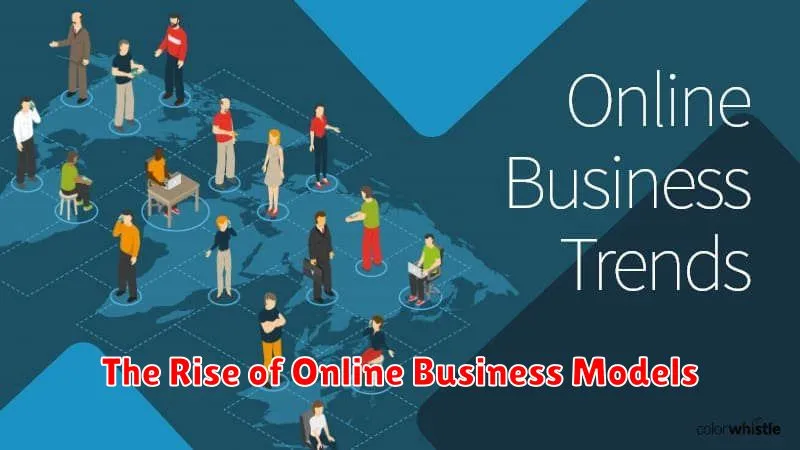Are you looking for lucrative online business ideas you can start today? This article explores the best online business opportunities available, covering various niches and skill levels, from high-profit online businesses to more passive income streams. Discover proven strategies and practical advice to help you launch your own successful online venture and achieve financial freedom. We’ll cover a range of options, including e-commerce, digital marketing, and freelancing, providing you with the best online business ideas to match your interests and expertise.
The Rise of Online Business Models

The internet has revolutionized commerce, fostering the explosive growth of diverse online business models. This shift is driven by increased accessibility to technology and a globalized marketplace. E-commerce, the most prominent example, allows businesses to sell products directly to consumers online, bypassing traditional retail channels.
Beyond e-commerce, subscription models have gained immense popularity. These models provide recurring revenue streams through services like streaming platforms or software-as-a-service (SaaS) offerings. The predictable income stream is a significant advantage.
The rise of digital marketing has also been instrumental. Businesses leverage online platforms for targeted advertising, search engine optimization (SEO), and social media marketing to reach potential customers effectively and efficiently. Affiliate marketing and influencer marketing further enhance brand visibility and sales.
Furthermore, the increasing importance of data analytics allows businesses to understand customer behavior, optimize operations, and personalize the customer experience. This capability contributes to higher conversion rates and greater customer loyalty. The ability to collect and analyze data is now a crucial aspect of successful online business models.
Finally, the development of freelancing platforms and the gig economy has enabled individuals to monetize their skills and offer services online, creating numerous entrepreneurial opportunities. This flexibility and accessibility have democratized business ownership.
Selling Digital Products and Services
Selling digital products and services offers a low-cost, high-profit business model with minimal overhead. You can reach a global audience without the limitations of physical inventory or geographical location.
Popular digital product examples include ebooks, online courses, templates (e.g., website templates, social media templates), stock photos, and printables. Digital services can encompass website design, social media management, virtual assistance, copywriting, and graphic design. The key is identifying a niche market with a demand for your expertise or products.
Success requires a strong online presence (often through a website or social media platforms), effective marketing strategies (such as content marketing and social media advertising), and high-quality products or services that meet customer needs. Building a strong reputation and positive customer reviews is crucial for long-term growth.
Affiliate Marketing as a Revenue Stream

Affiliate marketing presents a compelling opportunity to generate passive income online. It involves promoting other companies’ products or services on your platform (website, blog, social media) and earning a commission on each sale made through your unique affiliate link.
The low barrier to entry is a significant advantage. You don’t need to create your own products; instead, you leverage existing offerings. Success relies on building a targeted audience and creating engaging content that drives traffic and conversions. Careful selection of affiliate programs aligned with your niche is crucial for maximizing earnings.
While it’s not a get-rich-quick scheme, consistent effort in content creation and audience engagement can lead to a significant and scalable revenue stream. The potential for long-term growth is substantial as your audience expands and your affiliate partnerships mature.
Dropshipping for Low-Risk E-commerce
Dropshipping offers a low-risk entry point into e-commerce. Unlike traditional retail, you don’t need to manage inventory or handle shipping. You simply list products from a supplier’s catalog on your online store.
When a customer places an order, you forward the order details to your supplier, who then ships the product directly to the customer. Your profit is the difference between your selling price and the supplier’s wholesale price.
The low startup costs are a major advantage. You don’t need a large upfront investment in inventory, reducing your financial risk. This makes dropshipping ideal for entrepreneurs with limited capital.
However, profit margins can be thin, and you’re reliant on your supplier’s reliability for order fulfillment and shipping times. Competition can also be fierce. Success requires a strong marketing strategy to attract customers.
In summary, dropshipping presents a relatively low-risk and accessible path to starting an online business. Thorough research and a solid business plan are crucial for success.
Online Coaching and Consulting
Online coaching and consulting is a lucrative business idea you can start today with minimal upfront investment. Leveraging your existing expertise, you can offer personalized guidance and support to clients remotely. This could range from business coaching to life coaching, fitness coaching, or specialized niche consulting depending on your skills and experience.
The low barrier to entry makes it attractive; you primarily need a strong internet connection, a platform for communication (video conferencing, email), and a defined service offering. Marketing your services can be achieved through social media, networking, and content creation, showcasing your expertise and client success stories.
Scalability is a key advantage. As your client base grows, you can hire additional coaches or consultants to help manage the workload, increasing revenue potential significantly. The flexibility of setting your own hours and working from anywhere adds to its appeal as a viable and profitable online business.
Freelancing Skills You Can Monetize

The internet offers numerous opportunities to monetize your skills. Freelancing provides a flexible and potentially lucrative path to entrepreneurship. Several in-demand skills translate readily into profitable freelance ventures.
Writing and Editing remain consistently popular. This encompasses various niches like blog posts, website copy, technical documentation, and proofreading. Graphic Design, including logo creation, branding materials, and social media graphics, is another highly sought-after skill.
Web Development skills, including front-end and back-end development, are crucial in today’s digital world. Similarly, Digital Marketing expertise, encompassing SEO, social media management, and paid advertising, is always in high demand. Virtual Assistance, offering administrative, technical, or creative support to clients remotely, presents a versatile option.
Beyond these, Translation services, video editing, and data entry are additional skills that can be easily monetized through freelancing platforms. The key is to identify your strengths and market them effectively to prospective clients.
Creating Content for Monetization
Successful online businesses require a content monetization strategy. This involves creating valuable content that attracts an audience and generates revenue. High-quality content is key; it should be engaging, informative, and relevant to your target market.
Several methods exist for monetizing content. Affiliate marketing involves promoting other companies’ products or services and earning a commission on sales. Selling digital products like ebooks, online courses, or templates is another option. Advertising, through platforms like Google AdSense, can generate income based on ad impressions or clicks. Subscription models, offering premium content or services to paying members, provide a recurring revenue stream.
Choosing the right monetization strategy depends on your niche, audience, and content format. Experimentation is crucial to find what works best. Consistent content creation and audience engagement are vital for long-term success.
Remember to clearly disclose any affiliate relationships and prioritize providing value to your audience. Building trust and credibility is essential for sustainable monetization.
Choosing the Right Platform to Launch
Selecting the right platform is crucial for a successful online business launch. Your choice will significantly impact your reach, operational efficiency, and overall costs. Several factors need consideration.
Ease of use is paramount, especially if you lack technical expertise. A user-friendly interface simplifies setup, management, and ongoing maintenance. Scalability is another key factor; choose a platform that can adapt to your business growth without requiring significant restructuring.
Cost is a significant consideration. Evaluate setup fees, monthly subscriptions, transaction fees, and any other associated expenses. Compare pricing models across different platforms to find the most cost-effective solution for your budget.
Target audience influences platform selection. Consider where your ideal customers spend their time online. For example, a platform popular among younger demographics might be unsuitable for a business targeting older consumers.
Finally, integration capabilities are vital. Ensure the platform seamlessly integrates with other necessary tools like payment gateways, email marketing services, and analytics dashboards for streamlined operations.

